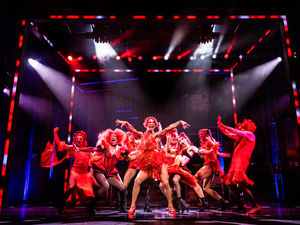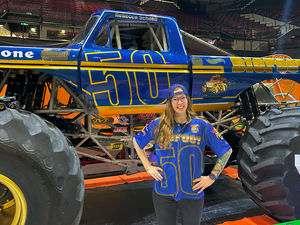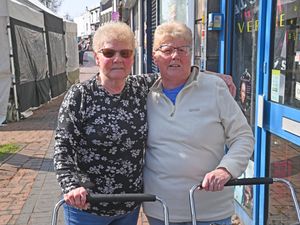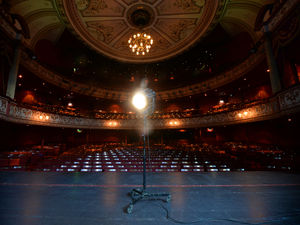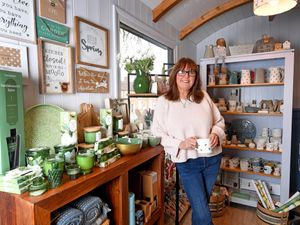Pure joy as Ian Broudie goes back on the road
Forget the hurt, it’s been 35 years of pure joy for Lightning Seeds, one of the country’s best loved bands. To celebrate this milestone, they have lovingly put together a 20-track greatest hits album ‘Tomorrow’s Here Today: 35 Years of Lightning Seeds’, which is out on October 4, before embarking on a 20-date UK tour this winter.
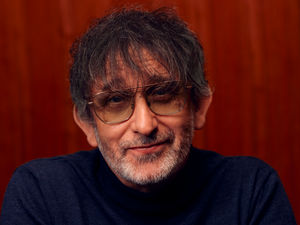
The tour ends at Wolverhampton’s Wulfrun Hall on December 14.
The Greatest Hits album is an absolute masterclass in modern pop songwriting from Ian Broudie. Kicking off with their classic debut single ‘Pure’, this really is a greatest hits disc worthy of the title from a band who have sold over eight million albums. Across 20 tracks the LP features Lightning Seeds favourites including ‘The Life Of Riley’, ‘Change’, ‘Lucky You’, ‘Sense’, ‘All I Want’, ‘Sugar Coated Iceberg’, ‘You Showed Me’, ‘Emily Smiles’, ‘3 Lions’ and more.
Ian Broudie said: “Wow, I can’t believe it’s been 35 years! Our first single ‘Pure’ really opened the door to a life’s worth of songs, shows and recordings. I owe everything to ‘Pure’ and I’m really looking forward to celebrating the 35th anniversary of its release with ‘Tomorrow’s Here Today: 35 Years of Lightning Seeds’ greatest hits album and tour in 2024.”
Prior to the band’s UK dates, they have a handful of shows in Spain – an unusual addition for a band that seldom tours in Europe, particularly post-Brexit, when the mass of red tape and regulation has made life more difficult for touring musicians. “We didn’t do much extensive touring over there, so we don’t really go. That’s a big regret, really. At the moment when we were at our peak, my son, Riley, was little, so I didn’t want to spend much time touring, I wanted to be at home with him. The knock-on effect is we go less these days. So to be going to Spain is really exciting.”
Back in the day, Lightning Seeds played much less live. That was largely down to Broudie’s reluctance and surprising lack of confidence as a frontman.
“I love playing live now. I didn’t feel that comfortable before but it’s my favourite thing now, I love it. I used to have a lot of nerves. I didn’t ever feel like a real singer. I always felt more comfortable being Keef, rather than Mick. That’s changed a bit, over time, though I still see myself as being more like Keef.
“I got sidetracked with Echo and the Bunnymen and producing. Fortunately Pure happened, which was a bit of a miracle. We had 200 copies pressed, we had no record label, and no manager, and no band. I’d bumbled around for 30 years and doing everything wrong and messing it up. I wanted to be a songwriter, not a producer, and I’d drift between the two – probably to the detriment of both.”
When Pure was a hit, Broudie didn’t have a band and didn’t play live. He felt uncomfortable with the idea of session musicians, despite their calibre, and his lack of confidence led him to want more than that – people who were in his band and able to commit.
“I’ve always wanted to play in a band, or with friends. When I signed to Sony, part of the agreement with the guy who signed me was that I’d start playing live. I was a real novice about playing live because I’d always been at home and made the records in my house or in the studio. I did Jollification in my studio.”
The guy who helped Broudie to overcome his shyness and anxiety was Terry Hall, the late, great leader of The Specials. He encouraged Broudie to sing and helped to change his outlook.
“Terry said if we did some gigs together and used the same musicians, he’d sing some songs, then I could sing some songs. Terry was a great mate, and that helped to open the door for me. He was a unique person and talent. That’s the way he was. We hit it off straight away and we’d go to gigs together. He was a mate who I’d go out with. He was a real, massive, positive influence in my life.
“Now, looking back, I don’t know how he convinced me of that. He was a genius. So it was really very kind of him because it gave me the confidence to do the first couple of gigs and it went on from there. I felt very uncomfortable for about 28 years and now I love the band, I love the people in the band, it’s great having my son, Riley, in the band, and he’s really good at it. The last five or six years, I’ve really enjoyed it and felt as though I belonged. I’m in a band, I’m in my 60s, the only time I know who I am and what I’m meant to be doing is when I’m on stage. I love it.”
Pure was the game changer for Lightning Seeds. Culled from the album Cloudcuckooland and released in 1989 on Ghetto records, the song peaked at No. 16 in the UK. The track is the band’s sole entry on the US Billboard Hot 100’s top 40, peaking at No. 31, and was the first hit for the band on the Billboard Modern Rock Tracks chart, peaking at No. 8 in May 1990.
It was the first song Ian Broudie had “completely written and sung, ever”. It was when producing a track for The Pale Fountains that Broudie was offered a chance to release some of his own material. He was originally apprehensive: “I didn’t think that many people would be interested if I’m going to be honest, I suppose I didn’t have the confidence really and I wasn’t in a band but I did want to put my music out and get it heard.”
Nonetheless, Broudie proceeded to record Pure at a studio in Kirkby. Two hundred copies of the single were originally pressed, but after some radio play and attention at The Haçienda, the song soon sprang to mainstream consciousness.
“Basically I never finished that song. And then the idea that this bloke was going to get 200 pressed up, I felt it would go nowhere and I’d be back producing in a couple of weeks. It was unexpected. I remember having this meeting with MCA in America and they must have had me on speaker phone. They wanted me to go out there on tour. I said: ‘Oh, I don’t sing in public, I’ve never sung in front of people.’
“There was silence in the room. I told them: ‘I haven’t got a group.’ They said they’d put a group around me. Then I said: ‘It would have to be the right people.’ And it went quiet, then the line went dead and they never called back. So I do think I messed it up for about 30 years, I’m not joking about that.”
A turning point came when a record company boss went to see Broudie at the studio, where he was producing Alison Moyet.
“I ended up signing to Sony and I’m still close with the guy who signed me, Rob. I’d never had that before. I didn’t really understand what it was all about.
“When I got on Sony, they organised everything and put me in hotels. I’d never had that before. I never did any gigs, it was a really strange thing. Even when it was Britpop and things were big, I felt I didn’t really know what was going on. I wanted to spend time at home and I was in a bit of a daze. I didn’t really embrace it, you know.”
But then, that’s always been the thing about Lightning Seeds. They’ve always been a step away from the mainstream, following their own path, rather than moving with the herd. They’ve always done their own thing. I think that’s right. It has its disadvantages and its advantages. I always see it as being like that journey from Liverpool to London. There’s a bit where you’re on the train and you can see the road and all the cars are driving past. I always saw the band as being like that. I felt like we were on the train and everyone else was on the motorway. We were not quite part of it. We were moving in the same sort of direction, but we were making our own way rather than travelling with everyone else.
“There was a thing for me when I was a kid and I’d grown up with all this music and it seemed to be second hand music, I didn’t really get it.
“And then during Britpop, I think those records were like that. The Charlatans were like The Kinks, Oasis were like The Beatles or T-Rex and Liam was trying to sing like Ian Brown or Johnny Rotten. And I mean that in a lovely way. But that wasn’t really what I wanted to do so the records we made sounded very different from the records of that era.
“When Pure came out, we’d be number one on the indie charts, then The Stone Roses would be number one.”
The Lightning Seeds formed in Liverpool in 1989 by Broudie, following the demise of his previous band. Originally a studio-based solo project for Broudie, the Lightning Seeds expanded into a touring band following Jollification. The group experienced commercial success throughout the 1990s and are well known for their single “Three Lions”, a collaboration with David Baddiel and Frank Skinner which reached No. 1 in the UK in 1996 and 2018, with a re-worked version also reaching the top spot in 1998.
Broudie had been around music for all of his life. He had been a member of the 1970s post-punk band Big in Japan and the new wave bands Original Mirrors and Care. By the late 1980s, Broudie was better known as a producer than as a musician, and had produced albums for new wave and alternative rock artists such as Echo & the Bunnymen, Wall of Voodoo and the Fall. His roots, in Liverpool, were an integral part of his make-up.
“Merseyside is important. The Coral are very much The Wirral, that’s a really big thing and it’s slightly different to Liverpool. I think Merseyside and the North West, including Manchester, have their own thing. People make a lot of the rivalry, but I always felt very close to New Order and Joy Division and those Manchester bands.
“The scene has always felt very wide. I’m very proud of Liverpool and I love Liverpool and I’ve always felt that Liverpool music has had a certain sound. There’s an element that’s a little bit awkward to Liverpool music. Manchester has always felt a lot more organised and the bands are massive, like Stone Roses or Oasis. Liverpool has always done something different. Bands like The La’s don’t quite go all the way, or The Bunnymen – how come they’re not The Cure.
“It feels like an emotional reserve in Liverpool where we shoot ourselves in the foot a little bit but there’s a romantic ideal that we don’t want to lose.”
The Lightning Seeds play Wolverhampton Wulfrun on December 14 and tickets are available from the venue. They will be supported by Staffordshire band, Gorstey Lea.

